|
|
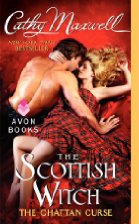 The second book in the Chattan Curse series, The Scottish Witch focuses on Harry Chattan, who is desperate to find a cure for the sickness which has overtaken his brother. Two hundred years ago, the Chattan family was cursed when Charles Chattan broke his handfasting to a Scottish girl called Rose. When Rose killed herself, her mother Fenella cursed the family forever; whenever a Chattan man fell in love, they would die shortly thereafter, after getting a wife pregnant with yet another Chattan male. Harry’s brother has fallen in love with his wife, and as a result, Harry searches for a way to cure his illness. While in the small village of Glenfinnan, where the curse originated, Harry meets Portia Maclean, a woman who is decidedly not a witch but has enchanted him nonetheless. The second book in the Chattan Curse series, The Scottish Witch focuses on Harry Chattan, who is desperate to find a cure for the sickness which has overtaken his brother. Two hundred years ago, the Chattan family was cursed when Charles Chattan broke his handfasting to a Scottish girl called Rose. When Rose killed herself, her mother Fenella cursed the family forever; whenever a Chattan man fell in love, they would die shortly thereafter, after getting a wife pregnant with yet another Chattan male. Harry’s brother has fallen in love with his wife, and as a result, Harry searches for a way to cure his illness. While in the small village of Glenfinnan, where the curse originated, Harry meets Portia Maclean, a woman who is decidedly not a witch but has enchanted him nonetheless.
Portia is a twenty seven year old spinster, firmly on the shelf; she doesn’t mind that as much as she minds being responsible for her family. They’re behind on rent, her mother is determined to stop her sister marrying for love, and Portia hasn’t been admired in far too long. When she discovers that Harry is willing to pay to find a cure, and coincidentally finds a book of spells with the name “Fenella” written inside, she can’t resist the opportunity to pay rent and buy financial security for a short time by pretending to be Fenella. But Portia hasn’t counted on the way she might feel towards Harry herself; not as a witch, but as a lonely woman.
The premise to this book was intriguing; Harry and Portia are thrown together because of a spell that really doesn’t have much to do with either of them, given it’s hundreds of years previous to the book’s events. Once they meet, though, it’s fairly clear that they are a great match, and the book follows their story in a fairly logical and enjoyable progression as they try to resist the curse but, of course, end up falling in love anyway. This is, after all, a romance novel.
While I didn’t completely fall head-over-heels in love with it, the book was a good solid read. I appreciated that Portia was a spinster, not a diamond of the first water or anything of the like, although Harry’s wastrel reputation is really not evident in this particular book at all. There is also quite a humorous interlude with Portia’s mother and an adoring military man who learns that the key to a woman’s heart is to ask her questions and actually make conversation with her – who would have thought! It adds up to a charming way to spend a few hours in the afternoon.
One note; I didn’t realise that it was the middle book of a trilogy and that the curse would continue through this book and into the next. This means that, even though this book has a traditional happy-ever-after with the couple ending up together, we don’t get a resolution to the curse plotline. That lack of a solid ending was really the only downside to a story that was otherwise romantic with a touch of magic.
The Scottish Witch is appropriately released today on October 30th, the day before Halloween, so if you’re looking for magic that isn’t scary, this could be the romance choice for you. The magic element is very light, so if you’ve enjoyed Maxwell’s romances before, don’t let it put you off, either. Recommended for romance readers.
All external book links are affiliate links. I received this book for free for review.
 Rinette Leslie, a girl who can read truth in flowers, is entrusted with a casket by Scotland’s dying queen. Destined for Mary, known to history as Queen of Scots, the casket contains predictions made by Nostradamus, meant to protect her from the folly in her future. But foolishly, Rinette shows the casket to her young husband, the man she loves with all her heart, and decides not to go back to Edinburgh to put it in its secret hiding place or give the casket to Mary. After all, she’s happy in her seaside castle, and she trusts him. But when the secret of the casket gets out, the lives of Rinette, her husband, and her young child are in grave danger. Rinette Leslie, a girl who can read truth in flowers, is entrusted with a casket by Scotland’s dying queen. Destined for Mary, known to history as Queen of Scots, the casket contains predictions made by Nostradamus, meant to protect her from the folly in her future. But foolishly, Rinette shows the casket to her young husband, the man she loves with all her heart, and decides not to go back to Edinburgh to put it in its secret hiding place or give the casket to Mary. After all, she’s happy in her seaside castle, and she trusts him. But when the secret of the casket gets out, the lives of Rinette, her husband, and her young child are in grave danger.
I’ve never heard of the art of “floromancy” before, but it’s an art that makes sense and has a grounding in history. Rinette can read flowers, by which I mean she can apply the meanings of flowers to the future. It kind of goes along with the idea that a certain color rose means passion, a different one love, a different one grief, and so on, but Rinette can see meanings in all different kinds of flowers, as though they speak to her. It’s an intriguing premise and adds an element of magic to what could have been a relatively standard historical thriller.
It is a thriller, this book; it’s full of twists and turns and death and mystery. Rinette is put through agonies on multiple occasions, her spirit crushed, buried in mourning and regret and sorrows, all due to a casket that she didn’t even want anything to do with. All she wants is to live quietly in Granmuir by the sea, and it’s a desire that grows with time as her life spins out of control, forced to the whims of the court and the royalty around her. Loupas did a great job creating such a sympathetic character who suffers much too severely for the faults of youth that many of us will recognize in ourselves. Her mistake in trusting the husband she adores, a man who clearly isn’t trustworthy, haunts her even as she seeks to find his murderer and exact revenge.
I also loved the refreshing take that this sort of book gave on sixteenth-century Scotland; we’re right at the start of Mary’s reign, and even at her court, many of the more controversial elements of her later life are only just beginning. The future is still completely open to her, but she’s not an admirable character, and it’s very clear that we’re not meant to like her or her mother. Instead, Rinette gets all of our sympathy, and she certainly deserves it.
I would definitely recommend The Flower Reader to a reader who is generally interested in historical fiction, particularly those who love Tudor era fiction but are tired of Henry VIII and his antics. It’s a well-paced, well-written read with a good basis in history but enough of a fantasy touch to make it feel fresh.
All external book links are affiliate links. I received this book for free for review.
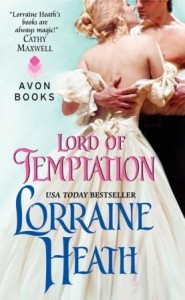 Lord Tristan Easton has been known as Jack Crimson since the tender age of fourteen, when his uncle plotted his death and that of his two brothers and he was forced to flee home for years on end. Now accustomed to the sea, he can’t imagine settling anywhere or with anyone, until Lady Anne requests the private use of his ship to visit her fiance in the Crimea. Though he knows she’s taken, Tristan can’t resist Anne, and asks for just one kiss in payment for her passage, envisioning much more. But what he doesn’t know is that Anne’s fiance is dead and buried, and the lovely lady has been lost in mourning herself for two years. Lord Tristan Easton has been known as Jack Crimson since the tender age of fourteen, when his uncle plotted his death and that of his two brothers and he was forced to flee home for years on end. Now accustomed to the sea, he can’t imagine settling anywhere or with anyone, until Lady Anne requests the private use of his ship to visit her fiance in the Crimea. Though he knows she’s taken, Tristan can’t resist Anne, and asks for just one kiss in payment for her passage, envisioning much more. But what he doesn’t know is that Anne’s fiance is dead and buried, and the lovely lady has been lost in mourning herself for two years.
I’ve never read a historical romance by Lorraine Heath before, but I’ve seen her books around and the synopsis of this one intrigued me. As usual, it’s not particularly appropriate for its time, and did suffer from a fairly typical romance novel flaw, but it was an absorbing, entertaining read nonetheless. It has elements that go along with a standard sea-faring dangerous captain story and other elements that fit more in a story that takes place entirely in society ballrooms, making for an intriguing mix and a book that kept me up late reading.
One thing that immediately caught my attention as I began reading was that Anne regretted not giving herself to Walter, her dead fiance, prior to his death. He asked, but being a proper lady, she refused until they were married. This regret, even though it would have ostracized her from society, is one of the drives that she has to say goodbye, and to avoid regretting anything that she does with Tristan as she discovers this new passion for him. She knew she loved Walter and how rare that was in contemporary society; she has no expectations of feeling quite that way again. So when she does discover a new passion, she embraces it with open arms.
Tristan, on the other hand, has obvious issues with loving anyone; having everyone he loved taken away from him at the tender age of fourteen, he hasn’t really recovered. His recovery is actually quite heart-warming to watch; even though this book does have its share of sex scenes, they’re also backed up by the couple’s discovery of one another and the reveal of their emotions for one another.
That brings me neatly to the stereotype the book falls into. It’s one of those where the hero / heroine don’t decide they love the other themselves. Instead, it’s up to someone else to tell them, only at which point do they realize it is actually true. This happens very frequently in this type of book and always kind of annoys me, I guess because it was obvious to me when I fell in love and certainly no one could have told me so. That aside, I can give these characters a bit of allowance because, actually, there is a reason for both of them not to want to admit that love to themselves. As a result, in this case I didn’t mind, except that it reminded me of all those times when I found it irritating.
There was another stereotype that the book just narrowly skirted, but which I was quite pleased about, so I have to give the author a lot of credit for neutralizing a potential issue and making a really great ending instead of an ending that caused me roll my eyes and disbelieve. I won’t say – because though we all know the couple gets together, part of the fun is how they make it there. But I was very pleased with this particular ending and I finished the book with a smile on my face.
Lord of Temptation certainly won’t be the last novel I read by Lorraine Heath – I just went and bought the first of this series, and I am most certainly looking forward to the third. Highly recommended for those who enjoy romance novels.
All external book links are affiliate links. I received this book for free for review.
 Newly crowned queen, Marie Antoinette and her husband Louis XVI represent a return to glory for France and new hope for the future – for a short while, at least. Unfortunately, the disaffection that the French feel towards their monarchy only grows, and Marie Antoinette, guilty or not, is the focal point of their unhappiness. Everything from her expenditure to her origin is put into question, whether right or wrong, and her struggle to have a child isn’t a help either. Throughout these difficult years of Louis’s reign, Marie Antoinette faces daily struggles in all areas of her life, from deceitful subjects to a secret affair to growing discontent among the French people. Newly crowned queen, Marie Antoinette and her husband Louis XVI represent a return to glory for France and new hope for the future – for a short while, at least. Unfortunately, the disaffection that the French feel towards their monarchy only grows, and Marie Antoinette, guilty or not, is the focal point of their unhappiness. Everything from her expenditure to her origin is put into question, whether right or wrong, and her struggle to have a child isn’t a help either. Throughout these difficult years of Louis’s reign, Marie Antoinette faces daily struggles in all areas of her life, from deceitful subjects to a secret affair to growing discontent among the French people.
Juliet Grey’s first book in the Marie Antoinette trilogy was incredibly captivating; the detail rich story of a young girl taken to a foreign court and specifically groomed to be a queen worked perfectly under her control. Days of Splendor, Days of Sorrow is much the same, while portraying the middle years of Marie Antoinette’s life and the start of her reign.
It’s easy to forget that this queen was just a teenager when her husband came to the throne; a lot of eighteen and nineteen-year-olds are completely incapable of acting like adults, and here she is expected to bear a child, settle down, and behave respectably. Forced into an incredibly awkward situation where she is unable to actually serve the purpose of getting France an heir through no fault of her own, she has nowhere to go but seek pleasure and distraction elsewhere.
Juliet Grey does an exceptional job of helping the reader understand Marie Antoinette’s faults and the reasons for them, especially when it comes to feeling sympathetic for her. That was definitely one of the highlights of the book for me; I felt so strongly for this particular character that I really wanted history to change. And even as it charged down its pre-set track, I still felt for her and wanted things to improve somehow, some way.
There were actually elements of the history that I’d forgotten but which were clearly pivotal in Marie Antoinette’s life and which play a big role in this book. I also really liked the way the author re-integrated some of the aspects of the previous book into the beginning of this one, so I was reminded of how much I appreciated the little details of her transition to a princess of France. It puts the book into its proper context.
It’s also a reminder of how welcome this trilogy is, as it does such a better job of portraying an entire life than a single book could. Marie Antoinette’s life is complex and changing. Even in this book, a considerable amount of time is skipped, but these years are very eventful ones and they set the scene for the inevitable, which we all know is coming.
This whole trilogy is a very well-done, evocative portrait of the French court during the reign of Louis XVI and Marie Antoinette, and does a fantastic job of getting inside the famous queen’s head and positing what might have motivated her to act as she did. Days of Splendor, Days of Sorrow is highly recommended – but I do suggest you start with the first in the trilogy. I’m simultaneously dreading and anticipating the last installment, as I’m sure it will be an excellent read, though incredibly heart-rending.
All external book links are affiliate links. I received this book for free for review as part of the Historical Fiction Virtual Book Tour.
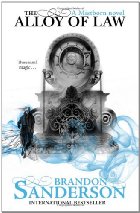 The Alloy of Law, Brandon Sanderson The Alloy of Law, Brandon Sanderson
A few hundred years after the original Mistborn trilogy, the world has moved on and progressed. The city of Elendel is a metropolis, and trains criss-cross the landscape. Criminals and lawmen alike carry guns, although the practices of Allomancy and Feruchemy in the Mistborn make life as interesting as ever. Our hero, Waxillium, is a noblemen who has taken to reviving the law in the rougher areas around the city. When personal tragedy ruins his happiness there, he returns to save his family’s estates, only to discover that the city may actually be more dangerous than the roughs ever were.
I’ve been a fan of Brandon Sanderson for a good few years now, since before I discovered he would be finishing The Wheel of Time (a discovery that delighted me at the time, but I’ve since failed to read a single book he’s written for this series). For the most part, I really enjoyed the original Mistborn trilogy, and I’ve been looking forward to The Alloy of Law for some time. While it ties into the original series, I think it stands quite well on its own and provides some excellent action, likeable characters, and an extension to Sanderson’s already very clever magic system. It’s just an all-around great read that was the perfect way to spend an evening.
Definitely recommended if you enjoy fantasy, as are all of Sanderson’s books; this isn’t an earth-shattering read, but it is a good one.
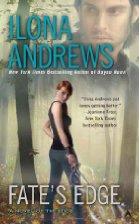 Fate’s Edge, Ilona Andrews Fate’s Edge, Ilona Andrews
Audrey Callahan wants nothing to do with the family that loves her drug addict brother, who ignores rehab and has attempted to sell her for drugs, more than her. In order to finally achieve the separation she craves, she must pull off one last heist using her unique magic ability to pick even the toughest locks. Unfortunately, that last heist kicks off a huge series of disasters, leaving Audrey on the run to get the stolen objects back with alarmingly attractive and skilled Kaldar Mar, a man who is unquestionably bad for her but somehow she can’t resist.
I’ve never quite liked Ilona Andrews’s Edge series as much as the Kate Daniels series. I don’t think it’s because the books are any worse, but it’s mainly because I don’t like the shift in protagonists each time. They feel more like paranormal romance with plot, instead of plot with ongoing occasional romance but mostly other epic awesomeness. This book, though, was probably my favorite of the three in the series so far. The spark between Audrey and Kaldar was fantastic, and the plot held together alongside that, as the reasons driving them to be together made some sense. Moreover, I remember lots of the characters from the previous books, so I felt a greater sense of continuity than I had previously.
I’d probably still recommend the Kate Daniels series first, but the Edge series of books are worth reading if you enjoy those. I can definitely say I’ll be picking up the fourth in the series when it’s released.
All external book links are affiliate links. I purchased these books.
 Good morning Saloners! I come to you this morning a bit disappointed that I haven’t been able to join in the Read-a-thon this time around. I love sitting down with a stack of books and spending an entire day doing very little but reading them. And with my glacial reading pace at the moment, I really could have done with that boost for my totals. We have a houseguest, though, and I don’t plan to ignore her in favor of books, so no participation for me this time around. Good morning Saloners! I come to you this morning a bit disappointed that I haven’t been able to join in the Read-a-thon this time around. I love sitting down with a stack of books and spending an entire day doing very little but reading them. And with my glacial reading pace at the moment, I really could have done with that boost for my totals. We have a houseguest, though, and I don’t plan to ignore her in favor of books, so no participation for me this time around.
This does mean, however, that we have an excuse to go to some of my favorite historic places since she’s never been to them. My husband has finally finished an exam he’s been studying for over the last two and a half weeks, and on weekends for about a month, so our weekends are ours again. Yesterday, we went to Fountains Abbey, which isn’t all that far away from where I live. It was a fairly chilly day, as we’re heading deeper into autumn, and so we didn’t have to contend with the crowds that my husband and I did on our last, warmer visit.
 Might be where the monks stored their food but it’s certainly beautiful now.  The abbey itself  Down the aisle of the church. Fountains Abbey is secluded in a valley and, after the Dissolution of Monasteries by everyone’s favorite Henry VIII, became part of an aristocratic estate which is now all owned by the National Trust. As a result, it still feels calm and peaceful, with a river trickling nearby and impressive later water gardens just past the abbey. Lovely spot on a sunny day, even a chilly one like yesterday.
In reading news, I only managed to finish one book this week, Fate’s Edge by Ilona Andrews. I have made a significant dent in Days of Splendor, Days of Sorrow by Juliet Grey though, and you should expect a review of both this week.
Have a great week, everyone, and I hope you’re all reading wonderful books and enjoying the change in seasons!
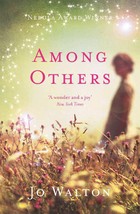 In recent years, since I’ve been keeping track, there have been two books that have catapulted themselves into becoming my instant favorite of the year. The first was The Remains of the Day by Kazuo Ishiguro. The second was The Guernsey Literary and Potato Peel Pie Society by Mary Ann Barrows and Annie Shaffer. The first has remained among my favorites ever, a book that I have forced on a number of people; for some reason my enthusiasm for the second hasn’t quite stuck nearly so much although I did love that book. Among Others by Jo Walton is now the third, a book that spoke to me in so many different ways that I couldn’t help but love it nearly from the first word. In recent years, since I’ve been keeping track, there have been two books that have catapulted themselves into becoming my instant favorite of the year. The first was The Remains of the Day by Kazuo Ishiguro. The second was The Guernsey Literary and Potato Peel Pie Society by Mary Ann Barrows and Annie Shaffer. The first has remained among my favorites ever, a book that I have forced on a number of people; for some reason my enthusiasm for the second hasn’t quite stuck nearly so much although I did love that book. Among Others by Jo Walton is now the third, a book that spoke to me in so many different ways that I couldn’t help but love it nearly from the first word.
Fourteen-year-old Morwenna’s life has been irrevocably changed by magic; from an early age she understood the consequences of wishing for something to be, and now her mother’s magic has cost her her twin sister and the full use of her leg. Mori, as she prefers to be known, runs away from her mother and ends up with her father, who had also run away from her mother, after a stint in a home for children. Sent to boarding school and away from everything and everyone she loves, except for her beloved science fiction, Mori struggles to find a life for herself and escape permanently from her mother’s influence.
There are so many ways in which I connected to this book. For one, very obvious thing, I lost my not-quite-two-years-younger brother when I was a teenager, and while it’s not the same as losing your twin I’m sure, losing a sibling that you’ve been so close to and grown up with changes your life in significant and very similar ways. As Mori notes, “The thing with dying, well, with death really, is that there’s a difference between being someone who knows they can really die at any time and someone who doesn’t.” This is something you learn when you lose your sibling at a young age, the person who you expected to be with you throughout your whole life as they had always been in memory, and the difference between life before and life after simply isn’t the same. Mori is younger than I was, but I felt like I understood her, immediately.
But it’s not just that. It’s the way that Mori grows as the story progresses over the year, the way that she discovers who she is in the absence of her surroundings, what she loves and who she can become, if only she can make that happen. Her journey is nothing less than inspiring, and though it might seem quiet on the outside, if you actually read a summarized plot, it has that ability that books I love best do to show you what happens when it looks, on the outside, like very little is happening at all.
That’s not to mention the fact that Mori loves books and spends her time surrounded by them. She reads mainly science fiction, but she has special places in her heart for fantasy and for historical fiction, and loves to learn the context about the stories she’s reading. I think this book would be even richer for someone who was more familiar with popular science fiction from the 70s, as Mori doesn’t hide her opinions and talks directly about the books she’s reading. For those I did recognize, her quotes and references are intelligent and certainly add an extra layer to the book. It would be nearly impossible, in my mind, for someone who also loves books to not relate to her, and not appreciate the way they save her from difficult situations over and over again.
Anyway, I hope I am getting across my sheer love of this book to you. After I finished, I simply sat for a while and thought of it, and actually couldn’t bring myself to start another book. I didn’t want to let Mori and her world go, not yet. Certainly not before I’d written this review, one of those rare times I’ve finished a book and immediately felt the urge to tell you all about it and persuade you to read it yourself.
So, clearly if you’ve been reading this, Among Others has my whole-hearted, enthusiastic recommendation. Please read this book, and then come back and talk to me about it. It’s won multiple awards, so it isn’t just me that fell in love with it, plenty of others have too.
All external book links are affiliate links. I purchased this book (one of the best pounds I have ever spent).
 It’s been all over the news in the last few weeks in the UK – archaeologists digging in Leicester may well have found Richard III. Even if it wasn’t across the internet, it’s now been covered by the magazines I read. It’s been all over the news in the last few weeks in the UK – archaeologists digging in Leicester may well have found Richard III. Even if it wasn’t across the internet, it’s now been covered by the magazines I read.
When a group of archaeologists from the University of Leicester began digging in a car park in a search for the Franciscan Priory where Richard was supposedly buried, I admit I was sceptical. Archaeology is fantastic and reveals tons of information that informs our understanding of the past, but searching for one person whose burial site has long been lost? I thought they were foolish to publicize the fact that they were actively looking for the king who has been the source of so much speculation because it was so unlikely that they’d find him. Yet here we are, with the archaeologists having found a skeleton that has clear evidence of unhealed battle wounds and one shoulder higher than the other, buried in the highest status position in the church and with evidence of a hurried burial without a coffin. With the dig covered in at least two of the bigger magazines this month, it’s a subject that has attracted a huge amount of attention:

I’m fascinated by this in a sort of morbid way. Like probably most others who study history, I like to visit the mortal remains of the people that I find most interesting. Plenty of them have been lost, and Richard III has always been one of those figures. Finding his bones, if the DNA analysis proves that they are his, changes a few things about history the way we’ve understood it. We may now discover if his shoulder was actually higher on one side and how the end of the battle went, but we’re still not going to know whether or not he killed the famed princes in the tower. Yet this particular king has caught public attention for hundreds of years, both as a popular villain and as a king that some feel deserves a break. He has a society devoted to him and many many works of history and fiction attempting to do one of the two.
I waver between these two attitudes. Understanding the context around the history makes the question even harder to answer, although I tend to lean towards the fact that they were murdered under his watch these days. Will that stop me from visiting his grave, if this is him and when they finally decide where he will lie (in York, as he possibly wished, or in Leicester, where he was found) after all these years? No, I don’t think so. If anything, it’s incredibly interesting to me to watch this unfold, as it will inevitably become part of Richard III’s history, more than five hundred years after his death, even if it isn’t him. It is a tiny part that I actually get to live through, and these reminders that history happens all around us, all the time, are always welcome.
Have you heard about this potential discovery? What are your thoughts?

Unfortunately, in the course of writing this review, I discovered that the author falsified some quotes in the book, and it was withdrawn from sale from both the US and the UK in August 2012. I’m not sure if I can review it now. I actually felt quite betrayed by this, because I’d never have picked up on the false quotes from Bob Dylan myself. I’d still recommend The Decisive Moment, a book about how exactly people go about making decisions, and what impact those decisions might have on others, but I’m afraid this review can no longer stand. This is a shame, because I thought Imagine could have been a fascinating look into human creativity, but unfortunately, it is mainly a poster story for the wrong kind of creativity entirely.
How do you feel when a non-fiction author essentially makes up details to support his thesis? How does this escape the attention of everyone in the publication process?
Another month gone, another monthly wrap-up post. Is it my imagination, or do these posts come closer together as we approach the end of the year?
September was incredibly indicative of the genre fiction I like – historical fiction, fantasy, and science fiction comprised more or less the entirety of the list. I am a bit disappointed that I didn’t manage any non-fiction this month, but my first book for October is non-fiction, so I won’t be too unhappy with that.
Here’s what I read, with 11 books in total:
- A Most Improper Magick, Stephanie Burgis
- Spartacus: Rebellion, Ben Kane
- Small Favour, Jim Butcher
- The Hidden Goddess, M. K. Hobson*
- 1356, Bernard Cornwell
- Ashes of Honor, Seanan McGuire*
- The Flower Reader, Elizabeth Loupas*
- Fledgling, Octavia E. Butler
- Blackout, Mira Grant*
- Daughter of Smoke and Bone, Laini Taylor*
- Imagined Lives: Portraits of Unknown People, anthology*
Except for the truly atrocious lack of reviewing, I haven’t done too badly! I’ve taken a page out of Memory’s book and put an asterisk next to the ones I intend to actually review. I hope by sometimes not reviewing books to be able to feel a bit freer around here – I already have been skipping some in practice, but it is better to get that out there.
Favorite of the Month
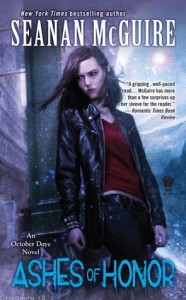 
I just loved the former, for all the reasons I love the October Daye series (and for Tybalt). Fledgling, on the other hand, was a book I enjoyed, but which also made me think, and I don’t always think as deeply about books as I would like to.
I could have added Blackout to this list, but I thought I should probably choose just one of the books by the same author.
What have you read in September that you’d recommend to me?
|
|
 The second book in the Chattan Curse series, The Scottish Witch focuses on Harry Chattan, who is desperate to find a cure for the sickness which has overtaken his brother. Two hundred years ago, the Chattan family was cursed when Charles Chattan broke his handfasting to a Scottish girl called Rose. When Rose killed herself, her mother Fenella cursed the family forever; whenever a Chattan man fell in love, they would die shortly thereafter, after getting a wife pregnant with yet another Chattan male. Harry’s brother has fallen in love with his wife, and as a result, Harry searches for a way to cure his illness. While in the small village of Glenfinnan, where the curse originated, Harry meets Portia Maclean, a woman who is decidedly not a witch but has enchanted him nonetheless.
The second book in the Chattan Curse series, The Scottish Witch focuses on Harry Chattan, who is desperate to find a cure for the sickness which has overtaken his brother. Two hundred years ago, the Chattan family was cursed when Charles Chattan broke his handfasting to a Scottish girl called Rose. When Rose killed herself, her mother Fenella cursed the family forever; whenever a Chattan man fell in love, they would die shortly thereafter, after getting a wife pregnant with yet another Chattan male. Harry’s brother has fallen in love with his wife, and as a result, Harry searches for a way to cure his illness. While in the small village of Glenfinnan, where the curse originated, Harry meets Portia Maclean, a woman who is decidedly not a witch but has enchanted him nonetheless.






















Recent Comments